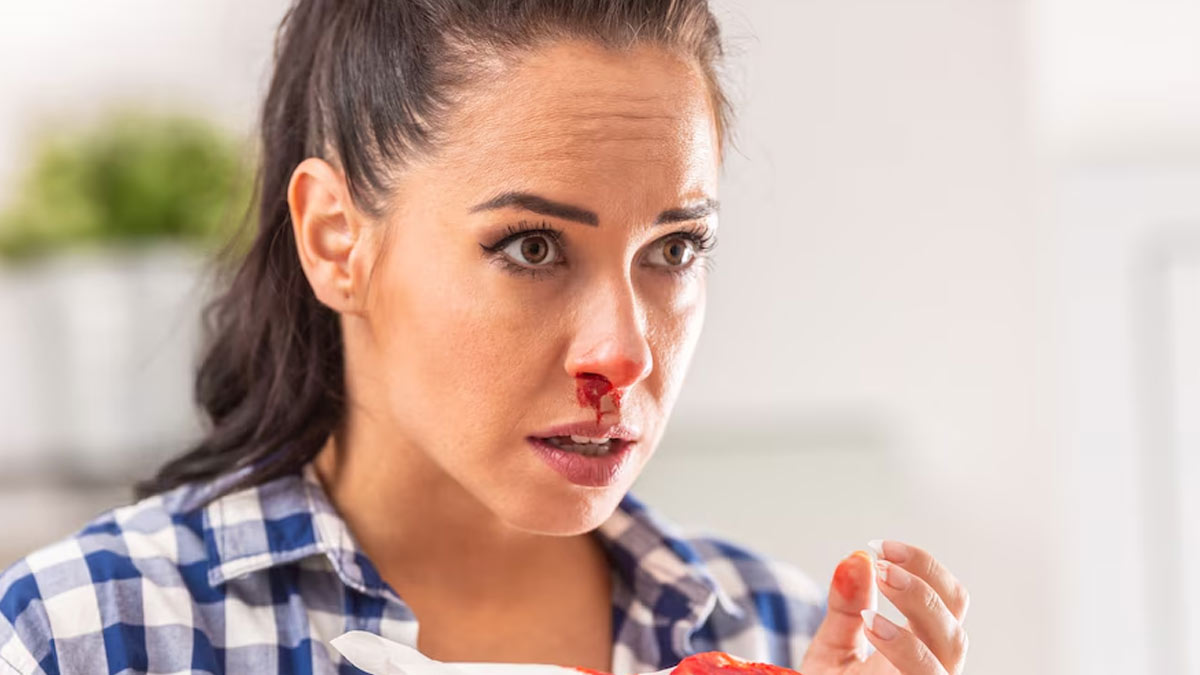
Nosebleeds are among the things that most of us have experienced at some time. A nosebleed, also known as epistaxis, occurs when a blood vessel in the lining of your nose bursts, causing blood to flow from one or both nostrils. Although the sight can be frightening, there is not always a worrisome cause for concern. We spoke to our expert Dr Jahnvi Jayesh Bhate, Consultant, Department of ENT, Amrita Hospital, Kochi, who explained the possible causes of nose bleeding and how to manage it.
Table of Content:-
According to StatPearls, around 60% of individuals have encountered a nosebleed at some point in their lives, with only 10% being severe enough to require medical intervention. Nosebleeds are most prevalent in children aged 2 to 10 and the elderly aged 50 to 80.
Causes Of Nosebleeding
Dr Bhate listed the possible causes of nosebleeding as follows:

Picking Your Nose
It's a common reflex when our noses feel itchy or uncomfortable, but picking our noses can lead to nosebleeds. Dr Bhate said, “The delicate skin inside our noses can easily be injured, causing it to bleed, especially in small children. Instead, try gently blowing your nose to avoid aggravating it further, and cut your nails.”
Allergies or Colds
You might have experienced a runny nose when dealing with cold or allergy symptoms. This irritation may cause the blood capillaries within our nasal cavities to burst, leading to nosebleeds. To prevent it, one should gently blow their nose with soft tissue paper and not apply excessive force while doing so.
Also Read: Decoding Nosebleeding: Doctor Explains Health Impactions And Its Prevention
Injuries
Dr Bhate said, “Just like any other part of our body, our noses can bleed if they're injured. Accidents happen, especially during playtime or physical activities, and a bump to the nose can result in bleeding.” It's essential to be cautious and try to avoid such incidents. If an injury does occur, local compression of the nose and applying ice can help reduce swelling, and one must try to reach a nearby hospital for first aid.

Dry Air
“Within our noses, there are small blood vessels that can become dry and fragile when exposed to dry air. This can occur during periods of low humidity, causing the vessels to break and trigger a nosebleed”, said Dr Bhate. Maintaining hydration by drinking plenty of water and using a humidifier in your living space can help prevent this. Make sure the humidifier of your air conditioner is working well.
High Blood Pressure
Elderly individuals with high blood pressure may be more prone to nosebleeds. Elevated blood pressure can put a strain on the blood vessels, increasing the likelihood of a rupture. Managing blood pressure through medication, diet, and exercise is crucial for overall health.
Also Read: Nosebleeding: Why It Happens & Increases in Summer
Nasal Infections
Infections, such as sinusitis or nasal polyps can inflame the nasal lining, leading to nosebleeds. The swelling and irritation caused by these infections can weaken blood vessels, making them more susceptible to bleeding. If you experience persistent nasal pain or congestion, seeking medical attention is advisable.
Nasal Tumours
“Although rare, tumours or growths inside the nose can cause nosebleeds by exerting pressure on blood vessels. If nosebleeds occur frequently or are severe, it's essential to consult a doctor to rule out any underlying issues and the need for further evaluation”, added Dr Bhate.
Expert Tips To Manage Nosebleeding
Dr Bhate listed some measures that you should follow during a nosebleed:
- You should try to stay calm when dealing with nosebleeding.
- Sit down and lean forward slightly to prevent blood from flowing down the throat. Apply gentle pressure to the soft part of the nose and breathe through the mouth. This helps to stem the bleeding by applying pressure to the blood vessels.
- Avoid blowing or picking your nose after the bleeding stops, as this could aggravate the area and lead to further bleeding.
- If the nosebleed persists for more than a few minutes or occurs frequently, seeking medical attention is recommended.
[Disclaimer: This article contains information provided by an expert and is for informational purposes only. Hence, we advise you to consult your expert if you have any health issues to get the necessary treatment.]
Also watch this video
How we keep this article up to date:
We work with experts and keep a close eye on the latest in health and wellness. Whenever there is a new research or helpful information, we update our articles with accurate and useful advice.
Current Version